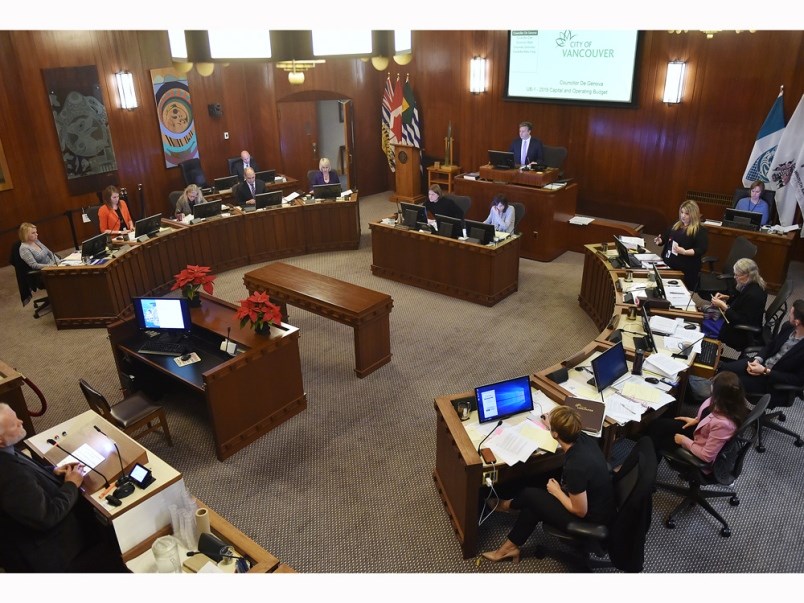A leading expert in social and public policy told Vancouver council Wednesday the country’s recovery from the pandemic will be “slow, bumpy and painful” and require continued intervention from senior governments.
Dr. Alex Himelfarb, the director of the Glendon School of Public and International Affairs at York University, said the pandemic is a crisis like no other because it combines an economic, a social and a health catastrophe.
“History doesn’t provide much guidance, given the complexity of this particular mix of crises,” he said, referring to the Great Depression.
“And given that the virus is still with us, and its future uncertain and some concerns about a possible resurgence, no model is going to be able to predict what the recovery is going to look like.”
But Himelfarb, who joined two local economists by telephone in a briefing to council, said recovery will not come without significant public investment, noting the private sector won’t simply bounce back.
Even before the pandemic hit Canada, the nation’s economy wasn’t entirely robust, he said, pointing out private debt was enormous and investment was lagging.
That reality makes government intervention “absolutely essential,” he said, acknowledging senior governments have already spent a lot of money to support Canadians and businesses.
“Without question, they have to spend more,” he said.
“What they’ve done up to now though has not been stimulus, it’s better thought of as a massive relief or aid program.”
The pandemic has revealed gaps in the funding of municipalities and the issues it sees directly such as homelessness, he said.
“Municipalities are on the front lines of taking the hit in the pandemic, and they’re going to have to be on the front lines of any recovery,” he said, arguing that municipalities need more senior government revenue sharing and tools to be more self-sufficient.
Himelfarb described the federal government’s recent announcement of gas tax transfer money to municipalities as “very modest.”
Municipalities, he said, should be eligible for wage subsidies already offered to businesses whose revenues have declined 30 per cent or more.
In Vancouver, city hall’s financial staff has forecast a $111 million deficit, with 1,800 workers still laid off and community centres, pools and other facilities shuttered.
Slavi Diamandiev, an economic advisor at Vancouver’s Deloitte office, said he expected the price of real estate in Vancouver and the jobs tied to it to be “damaged” as the pandemic persists.
“Our expectation is that, nationally, we’ll see about a five per cent correction on the residential side, and that’s probably associated with a double-digit correction in the more unaffordable areas of the country such as Vancouver,” said Diamandiev, noting about 25 per cent of B.C.’s economy is tied to the real estate industry.
He said the impact on the commercial real estate sector is likely to be worse because of the changing patterns of consumers and employees.
“Even before COVID, we were seeing strong trends towards working from home and online shopping,” he said.
“With the acceleration from COVID, those [trends] aren’t going anywhere, and I think that’s going to result on impacts in our commercial real estate market.”
The pandemic’s impacts on transit ridership have also been felt in Vancouver and the region, with John Merkley, an economic consultant with TransLink’s pandemic response planning team, telling council it’s a trend across North America.
Trying to rebuild confidence in transit riders will take time, he said, even if and when a vaccine is made available to combat the virus.
“You’d still see quite a bit of time pass before that residual fear fully subsides,” he said, referring to studies in Hong Kong and Taipei.
“We found that even after the disease had completely died out, there was a period of three or six months where demand was still considerably below normal levels.”
Himelfarb said the virus has preyed on the country’s inequities, turning “cracks into chasms,” with the poor and the most vulnerable hit hardest during the pandemic.
Examples are the tragedies in nursing homes, the failure to address chronic homelessness and the deadly consequences of prison overcrowding.
Women, he said, have also been hit hard.
“This is the first time in history that this is a service sector-led recession,” he said.
“This is the first time in history, as well, that women — who are overrepresented in the service sector — have taken the largest hit in this recession.”
That hit, he said, has been economic and social in that much of the burden of home care and home schooling has fallen to women.
“In any recovery, women’s issues are going to have to be central and, to put it really simply, there will be no recovery without childcare,” said Himelfarb, adding that Indigenous people and people of colour, who already face significant health inequities, have suffered from the economic fallout.
“And that, too, will have to be addressed.”
It will take a mix of health, social and economic investment to help Canadians and businesses recover, he said, adding that addressing people’s health fears, strengthening mass transit and moving minimum wage towards a living wage are keys to recovery.
“And there’ll be no sustainable recovery if we don’t act boldly to address climate change and nature laws,” he said.
@Howellings



